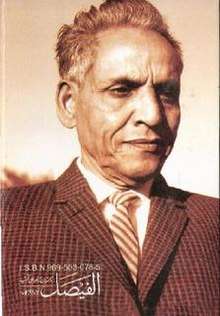Mumtaz Mufti
Mumtaz Mufti (Urdu: ممتاز مفتی; September 11, 1905 – October 27, 1995), was a writer from Pakistan.[1]
Mumtaz Mufti ممتاز مفتی | |
|---|---|
 | |
| Born | 11 September 1905[1] Batala, Punjab, British India |
| Died | 27 October 1995 (aged 90)[1] Islamabad, Pakistan |
| Occupation | Writer |
| Nationality | Pakistani |
| Genre | Fiction writer, sufism |
| Subject | Literature, philosophy, psychology, socialism |
| Notable works | Ali Pur Ka Aeeli, Alakh Nagri, Labbaik, Un Kahi, Talash, Muftianey |
| Notable awards | Sitara-e-Imtiaz, 1986 Munshi Premchand Award, 1989 |
| Website | |
| www | |
Early life
Mumtaz Mufti was born in Batala, Punjab (now in India). He was the son of Muhammad Hussain and his first wife Sughra Khanum. He was employed as a civil servant under British rule, having earlier started his career as a school teacher. Soon after partition in 1947, he migrated to Pakistan with his family.[2]
As a writer
Mumtaz Mufti started writing Urdu short stories while working as a school teacher before 1947. In the beginning of his literary career, he was considered, by other literary critics, a non-conformist writer having liberal views, who appeared influenced by the psychologist Freud.[1] Pakistan's famous writer Ashfaq Ahmed was one of his close friends. According to Ashfaq Ahmed, Mufti used to read unpopular literature by a Swedish writer before 1947. Mufti initially did not like the 1947 partition plan of British India, but changed his views later to become a patriotic Pakistani. In his later life, he used to defend Islam and its principles.[1] His transformation from Liberalism to Sufism was due to his inspiration from a fellow writer Qudrat Ullah Shahab. Despite all the changes in his viewpoints, he did manage to retain his individual point of view and wrote on subjects which were frowned upon by the conservative elements in the society.[1]
The two phases of his life are witnessed by his autobiographies, Ali Pur Ka Aeeli (1961) and Alakh Nagri. According to forewords mentioned in his later autobiography, Ali Pur Ka Aeeli is an account of a lover who challenged the social taboos of his times, and Alakh Nagri is an account of a devotee who is greatly influenced by the mysticism of Qudrat Ullah Shahab.[3]
The book Talaash ("Quest") was the last book written by Mumtaz Mufti. It reportedly highlights the true spirit of Quranic teachings.[4][1]
Awards and recognition
- 1986: Sitara-e-Imtiaz (Star of Excellence) Award by the President of Pakistan[2][5]
- 1989: Munshi Premchand Award (a literary award from India)[5]
Works
- Ali Pur Ka Aeeli (Urdu: علی پور کا ایلی) is Mufti's 1961 autobiography describing the first phase of his life. Initially, this book was considered to be a novel but later it was revealed to be an autobiography.[5]
- Alakh Nagri (1993 Urdu: الکھ نگری) is Mufti's autobiography describing the second phase of his life.[3]
- Labbaik (1975 Urdu: لبیک) (a report on his Hajj pilgrimage)[1][3]
- Samay Ka Bandhan (1986) سمے کا بندھن [3]
- Piyaaz Ke Chhilkay (1968) پیاز کے چِھلکے [3]
- Talash (Urdu: تلاش) (book highlights the true spirit of Quranic teachings)[1]
Legacy
His son, Aksi Mufti, a literary critic himself, created a Mumtaz Mufti Trust after his death in October 1995. This trust has been observing Mumtaz Mufti's death anniversary events in different cities of Pakistan. His friends and admirers, including Ashfaq Ahmed, Bano Qudsia and Ahmad Bashir have appeared as speakers at these events.[1] Another famous writer Kishwar Naheed comments in one of her book reviews that Mumtaz Mufti had plenty of human weaknesses but also has appreciated him as a learned critic.[1] There is a road named after him in the city of Multan, Pakistan.[1]
References
- Recalling Mumtaz Mufti: LAHORE LITERARY SCENE, Dawn (newspaper), Published 10 November 2001, Retrieved 4 September 2017
- Biography of Mumtaz Mufti on urduadab4u.com website, Retrieved 4 September 2017
- Biography of Mumtaz Mufti on goodreads.com website, Retrieved 4 September 2017
- Mumtaz Mufti interviewing folk singer Tufail Niazi at Lok Virsa, Islamabad event on YouTube, Published 5 April 2013, Retrieved 4 September 2017
- Profile of Mumtaz Mufti on samaa.tv website, Published 27 October 2011, Retrieved 4 September 2017